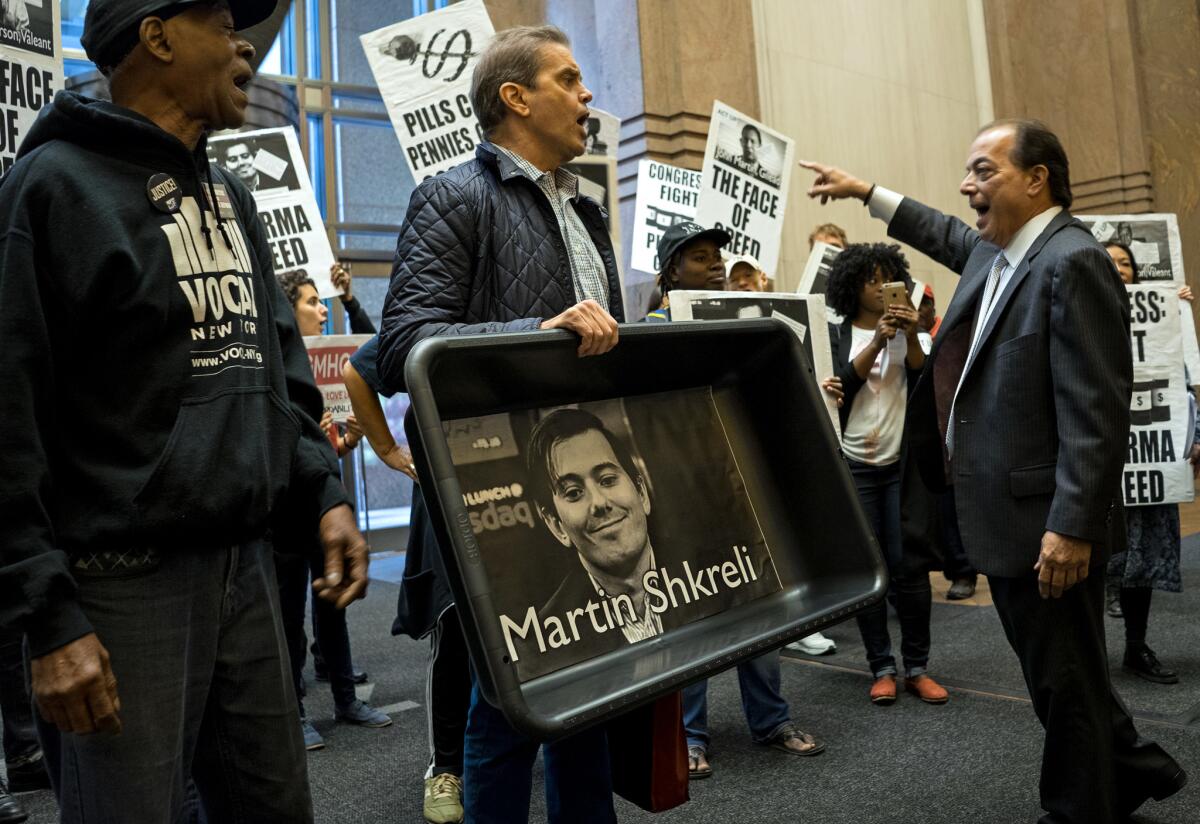Column: How that CEO who jacked up a drug price by 5,000% is roiling biotech--again

Not the most popular guy in the world: A protester carrying a cat litter box lined with an image of Turing Pharmaceuticals CEO Martin Shkreli appears at Turing’s New York offices in October.
Everyone who follows the drug-pricing controversy already knows the exploits, if not the name, of Martin Shkreli.
He’s the CEO whose company, Turing Pharmaceuticals, acquired the rights to a drug that’s crucial for some HIV and cancer patients and promptly jacked up its price by 5,000%, to $750 per pill from $13.50. (We covered the episode here.)
The action didn’t make him a very popular figure in the patient advocacy community. Now it turns out that he’s not so popular among some biotech investors, either.
This was a company on death’s door and it was rescued by a well-known investor. Would you expect it to go down?
— KaloBios CEO Martin Shkreli
That’s because of what’s been happening to the shares of KaloBios Pharmaceuticals, a South San Francisco firm that named Shkreli chairman and CEO on Nov. 19, just after an investment group he leads acquired 70% of the company.
That was bad news for short-sellers in KaloBios, because the shares quintupled in price that day, to $10.40 from $2.07. They rose as high as $39.50 in the next couple of days before falling back a bit.
Some market observers see signs of a deliberate short squeeze, in which short-sellers are forced to buy frenetically to limit their losses, in these numbers. Some are even comparing it to the most celebrated short squeeze of all, a 2008 rally executed by Porsche in Volkswagen shares that briefly made Volkswagen the world’s most valuable company and may have extracted as much as $15 billion from investors on the short side.
Shkreli argues that the run-up in KaloBios is perfectly natural. “This was a company on death’s door and it was rescued by a well-known investor,” he told me Monday (referring to himself). “Would you expect it to go down?”
But he didn’t exactly make the shorts’ lives any easier: On Thanksgiving, Shkreli announced via Twitter that he would cease lending his Kalo shares to shorts. That was followed by another spike in the stock when trading resumed on Friday--to $34.83 from the pre-holiday close of $26.63. One trader got so whipsawed that he launched a GoFundMe campaign for donations to cover a trading account that went from $33,000 in the black to a crushing debt of more than $106,000 in two days. (He raised a bit over $5,000.) Forbes contributor Jay Somaney called for an investigation by the Securities and Exchange Commission into how KaloBios was “rampantly manipulated.”
A few words of explanation may be due here on short-selling. Shorts sell stock they don’t own, in the plan to buy it later at a lower price than they sold it for--it’s the usual buy low, sell high formula in reverse time, as they’re selling high first and buying low later. Obviously their expectation is that the stock is due for a decline; if it rises instead, their potential losses are infinite, since a stock can rise indefinitely.
When a heavily shorted stock soars, shorts are forced to buy to cover their obligations before it rises even higher. A large short position is generally considered bullish for a stock, since the shorts’ buying can add fuel to a rally.
One other point: Shorts can’t just sell anything. They must have access to borrowed shares, either by having them in hand or showing that they can produce them if necessary. That’s why Shkreli’s announcement that he wouldn’t lend shares out of holdings of as much as 70% of the existing shares redoubled the shorts’ crisis--”wreaking havoc in the already chaotic situation,” as the online newsletter Streetinsider.com put it.
KaloBios was a popular short before Shkreli appeared. One struggling biotech among many, it had announced on Nov. 13 plans to “wind down operations,” laying off dozens of employees and ending its promising development programs for two blood cancer drugs.
Shkreli professes to have no interest in how the shares of KaloBios are trading. “Stock markets are not my focus,” he says. “Making great drugs is how I make my money.” He says he’s pursuing a clinical trial for a KaloBios drug aimed at chronic myelomonocytic leukemia (CMML). “What is a promising cancer drug worth these days?” he asks.
Good question: It’s indeterminate. But the shorts who landed on the wrong side of trades in the company might well measure it in the price of their fleece.
Keep up to date with Michael Hiltzik. Follow @hiltzikm on Twitter, see our Facebook page, or email [email protected].
More to Read
Inside the business of entertainment
The Wide Shot brings you news, analysis and insights on everything from streaming wars to production — and what it all means for the future.
You may occasionally receive promotional content from the Los Angeles Times.











